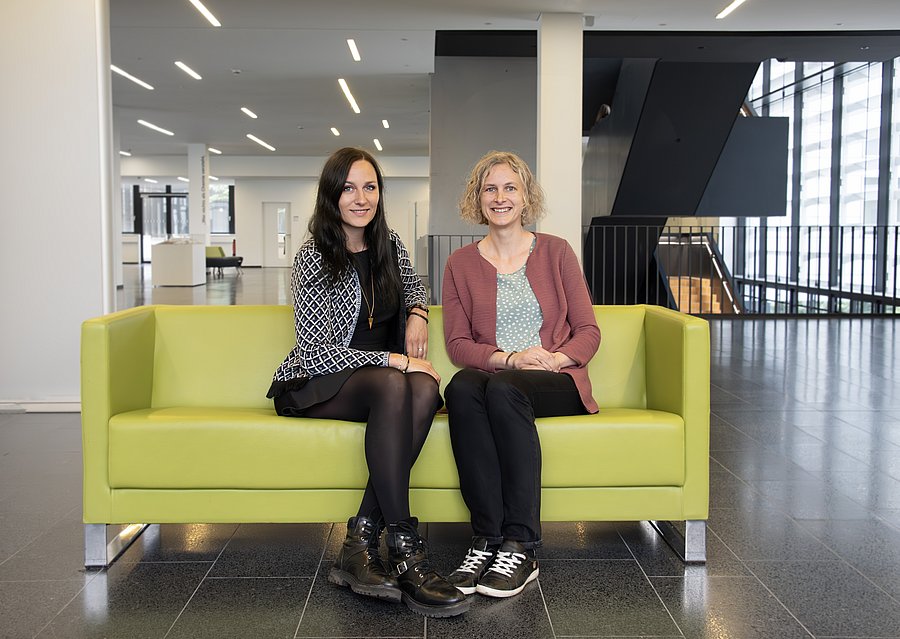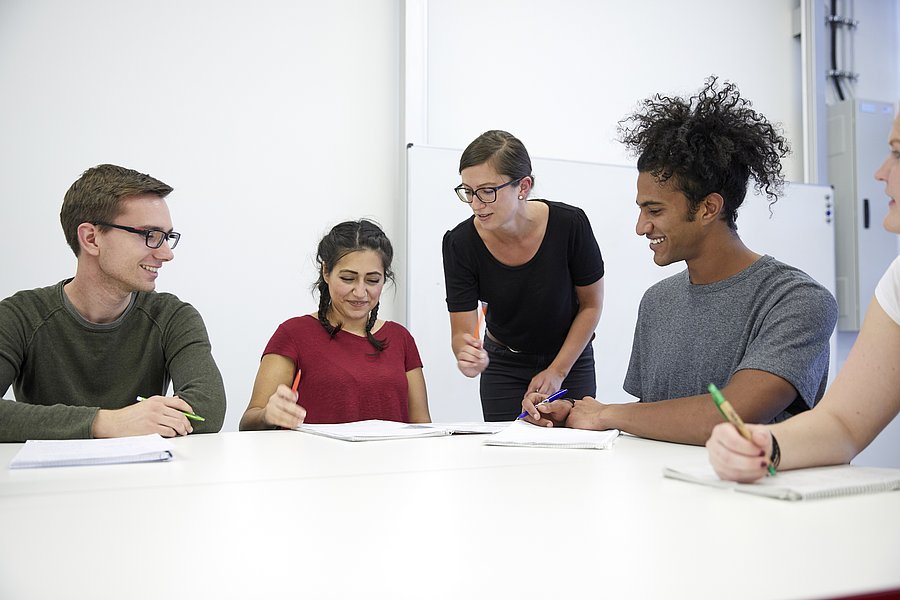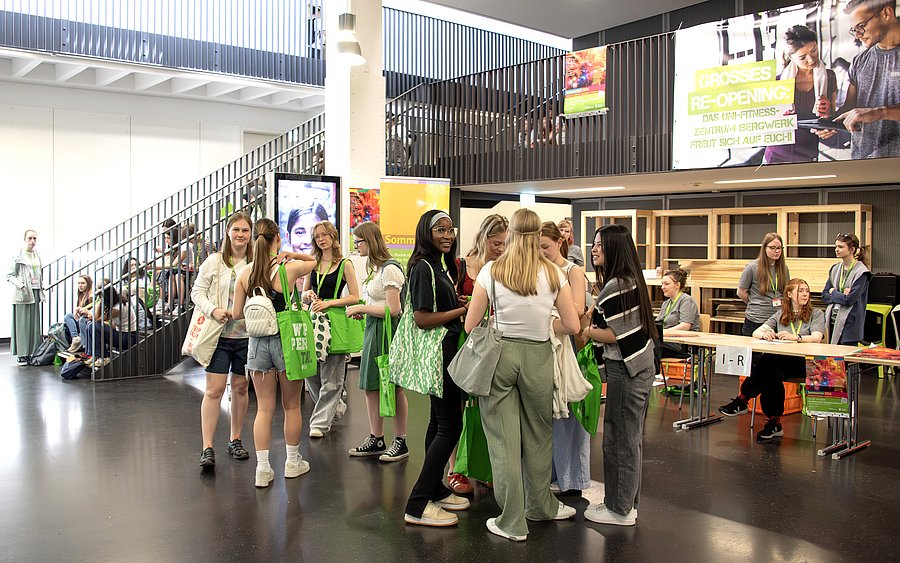"Double Pack"-Interview
"Equal opportunities and diversity units are cross-cutting tasks that affect us all"

Sophie Charlott Ebert (left) and Prof Dr Julia Bornhorst have valuable tips for young female academics and are committed to the further development of equal opportunities and diversity units at the University of Wuppertal // Photo Friederike von Heyden
Ms. Bornhorst, you have been a professor of food chemistry in Wuppertal since 2019 and sought contact with Ms Ebert shortly after your arrival. How did that come about?
Bornhorst: I was previously a junior researcher at the University of Potsdam and benefited greatly from the support programmes there. That's why I wanted to find out what opportunities were available at the University of Wuppertal - for me personally, of course, but also to get actively involved in promoting early career researchers.
What specific support did you receive?
Bornhorst: Ms. Ebert gave me valuable tips and showed me how I could get involved. I received a lot of information about support programmes for different career stages, opportunities for further training and mentoring programmes. I think it's great how you are supported if you want to apply for one of these programmes. I was able to use all this information for myself and pass it on to my working group. I consider the promotion of young talents to be very important and want to give my doctoral students every opportunity, especially during this qualification phase. So that they not only work scientifically, but also think outside the box, build networks, find out what other important topics there are in the world besides their own scientific qualification.
Ms Ebert, is this the typical way: do scientists approach you?
Ebert: It varies. I'm involved in the onboarding process and meet the new academics at events at the university to make them aware of what we offer. Some come to me directly for advice on career development programmes - or on equality and diversity issues in general. It also happens that I hear through contacts that a person from a department would like to deal with the topic of abuse of power, for example. I then contact this person directly and invite them to a discussion so that we can exchange ideas. Simply because it's important to me that we don't work on the same topics in different places at the same time, but that we join forces and utilise synergy effects.

The development of support measures for female junior professors is one of many different areas that the equal opportunities and diversity unit at the University of Wuppertal is driving forward. // Photo Ralf Baumgarten
So this exchange works for both sides?
Ebert: Definitely. I work here at a central level and it is of course very valuable to gain an in-depth insight into our different schools. It also helps me to identify gaps and see where we might need to sharpen up and create even better support programmes. And when academics approach me and say 'I would like to develop equality and diversity measures in my school', that's exactly what I want. My topics are cross-cutting issues that affect us all. And in every single activity that is carried out here at the university, there is a little bit of my topics - even if this is sometimes not immediately visible. Once projects have been tested on a small scale, we always look at how they fit in with the organisation as a whole and whether we can transfer them to the entire university, for example.
How will you continue to develop the programme for female academics at the University of Wuppertal?
Ebert: Such measures are constantly being developed. We regularly look at the needs of our university to see where we can still provide support and create new measures, test them out and develop them further. Last year, for example, we launched our first support programme for female junior professors as a test balloon, which we have continued this year. In the programme, the junior professors can decide for themselves how they want to spend their funding. For example, they can use it for childcare costs if they need additional care for their children during off-peak hours. Or they can spend the money on specific further training that is not covered by our large further training programme.
From your previous experience as the mother of a one-year-old, Ms. Bornhorst: How difficult is it to have a career as a scientist and mother?
Bornhorst: Difficult is the wrong word. More like challenging. Your own personality and individual situation also play a role. The model that my husband and I have opted for is profitable for both of us. I really enjoy doing science and teaching and can continue to do so while knowing that childcare is guaranteed. But I also know many female academics who have taken parental leave in the traditional way. Most of those who do science don't do it because it's a job, but out of passion. And so they are never really out of it during parental leave.
Ebert: When it comes to starting a family and balancing work and family life, you also have to take into account the phase the woman is in. After all, a female scientist in a vulnerable position with a fixed-term contract naturally has a harder time than a professor with a permanent position. We simply have to realise how our academic system works and that we provide as much support as we can.

A successful format: every year, schoolgirls from all over Germany come to Wuppertal for the SummerUni to learn about study programmes in the fields of mathematics, information technology, natural sciences and technology (STEM). // Photo Friederike von Heyden
Ms. Bornhorst, you have been your school's Decentralised Equal Opportunities Officer since 2020. Why did you stand for election back then?
Bornhorst: Over the course of my career, I have learnt that science is much more than just standing in a lab and producing data. Namely, that issues such as equality, diversity and leadership management also play a role. I have benefited from numerous funding programmes and wanted to give something back. And I've never regretted taking the step, because it's been a great experience so far. In the STEM subjects, we face the major challenge of having to generate young talents - especially female talents, of course. At the "Summer University", for example, we were able to allay many people's fears and get them interested in our subjects. That makes me very happy.
What are your tasks?
Bornhorst: Our equal opportunities team in the School of Mathematics and Natural Sciences has already initiated many measures and closed some gaps with support programmes. For example, young female academics with dependent children can apply to us for conference scholarships so that they can take their children and carers to the conference if necessary. We also have a programme in which we provide female students, doctoral candidates and postdocs with an assistant for a certain period of time during pregnancy and breastfeeding periods to take over laboratory work, as this is no longer possible for health and safety reasons. In this way, the next qualification goal can be achieved without delay. We have already been able to support a number of young female scientists with this programme and want to expand it further.
Where do you see challenges for the future in terms of gender equality at the University of Wuppertal?
Ebert: We should investigate how we can encourage more women to do a doctorate and actively decide in favour of a career in science. And then also ensure that we pave the way so that family and career in academia are compatible. That there are more equal opportunities, less discrimination - also in the further course of a career. We must continue to work on achieving parity at some point, so that there are more and more female professors - especially in those areas where women are still underrepresented.
What would you like to see in the future?
Bornhorst: The support we have received so far is really good and varied and every female scientist should take a look at it and make use of it. If money wasn't an issue, I would like to see even more support for female postdocs. We have great programmes for female doctoral students, but we still have some catching up to do for the phase after that.
Ebert: We already have a very good proportion of female professors. We can see from this and from many small moments that the gender equality work of recent years is bearing fruit. Our "Summer University" also ensures that we have a measurably high proportion of female students in subjects in which women are otherwise underrepresented - even if we look at the situation in NRW and nationwide. But we still have to think about how we can convince these women to actively decide in favour of a career in science after their studies. Beyond the university, I would like to see the issues of equal opportunities and diversity unit not being viewed in competition with each other. We should look at equality from a more diverse perspective. A first-generation academic with a migration background has a very different starting point to a young female academic whose mother is a professor and therefore needs very different support. Such programmes need to be developed much more at universities in the future. And that is one of my goals.
Support programmes
The university relies on targeted support programmes and an incentive system to promote young female talents. The Science Career Centre offers the "Appointment and Career" excellence programme to support talented (young) female scientists in their career planning and career development in science and research and to prepare them specifically for a professorship.
In cooperation with Heinrich Heine University, female academics from Wuppertal can apply to take part in the Selma Meyer Mentoring Programme, which supports young female academics in planning and developing their academic or non-academic career path. A contingent of places is available for this programme.
The university's own support programme "Quality, Incentive and Success" was launched for the first time in 2006. The programme includes the Equal Opportunities Award for outstanding, innovative projects and structural measures in the area of promoting women and families, as well as a special fund for graduate support for women.
The her.culis support programme is aimed specifically at female Bachelor students in Faculties 1, 2 and 4. It offers participants the opportunity to work on their own projects and make valuable contacts with experts. They also receive remuneration for their work and have access to workshops that develop their scientific expertise. her.culis is supported by the Research Training Group 2696.
The Centre for Graduate Studies (ZGS ) is responsible for the funding programme Promovieren mit Kind(ern). It supports doctoral students with child(ren) who are doing a doctorate at BUW and are exposed to multiple burdens due to the combination of bringing up children and their own academic qualification. Doctoral students can receive support from an assistant employed at the ZGS for up to five hours per week. The funding programme, which will initially run until 2024, is financed by funds from the University of Wuppertal's Equal Opportunities Award.
